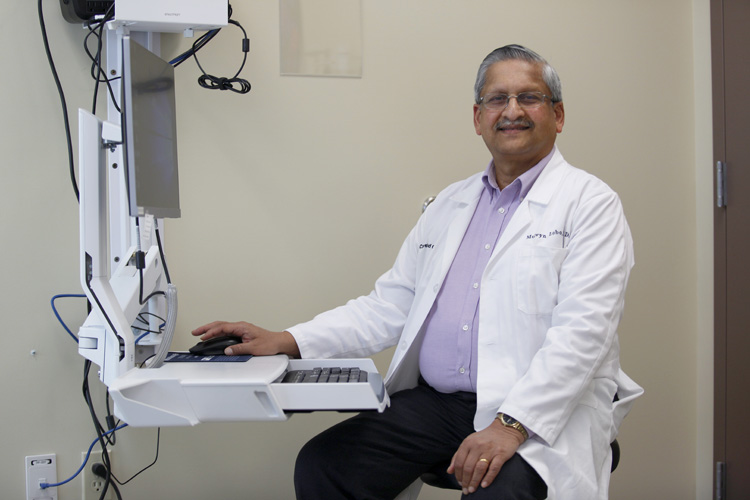A small butterfly shaped gland in the neck has caught the attention of the Cleveland Clinic Indian River Hospital’s Pointe West family practice physician Dr. Melvyn Lobo.
Weighing in at a mere 15 to 25 grams (or 0.5 to 0.8 ounces), the thyroid gland affects nearly every organ in the body.
According to the National Institutes of Diabetes, Digestive and Kidney Diseases at NIH, this tiny gland actually controls the way your heart beats, and without enough thyroid hormones, many of your body’s functions can slow down dramatically and result in a host of problems.
At the same time, too many hormones from the gland can create an entirely different set of problems.
“Hypothyroidism” is the medical term for the thyroid producing too few hormones while “hyperthyroidism” refers to that same gland producing too many.
According to Lobo, “we see a fair number of patients in our office with hypothyroidism,” which at first glance might seem odd since it is a relatively rare condition, according to NIH, affecting less than 5 percent of the population.
However, since hypothyroidism is most common in people over the age of 60, Vero Beach’s demographics tend to support Lobo’s report of seeing people with the disease frequently.
According to NIH, “women are much more likely than men to develop hypothyroidism,” and it is not a condition to be taken lightly.
The Johns Hopkins Department of Endocrinology, Diabetes and Metabolism says hypothyroidism can lead to tiredness, weight gain, depression and abnormal bone development.
Oddly, Hopkins also reports “the most common cause [of the condition] is the body’s own immune reaction to itself when it produces antibodies that actually attack the thyroid gland,” and it adds that “treatments for other thyroid conditions can also trigger hypothyroidism.”
According to Lobo, “fatigue, intolerance to cold, coarse hair and hair loss, brittle nails, decreased sweating, depression and weight gain are some of the symptoms that patient may present with.”
The Mayo Clinic agrees. It says “at first, you may barely notice the symptoms of hypothyroidism, such as fatigue and weight gain. Or you may simply attribute them to getting older. But as your metabolism continues to slow, you may develop more-obvious problems including chronic fatigue, increased sensitivity to cold, constipation, dry skin, a puffy face, muscle weakness, elevated blood cholesterol, depression and impaired memory.”
The good news?
Once diagnosed, says Lobo, “the treatment of overt hypothyroidism is pretty straightforward.”
“The recommendation,” according to Lobo, “is replacement [of the missing hormones] with Levothyroxine. The medication is to be taken about an hour prior to breakfast. Some medications can interfere with absorption and thus should be taken at least two hours later after taking Levothyroxine. These include iron, calcium, aluminum hydrochloride and several of the medications used to treat gastric reflux. Follow-up testing is done in about four to six weeks to determine [the patient’s] response to therapy.”
NIH adds that “some prescription medicines can also interfere with thyroid hormone production and lead to hypothyroidism, including amiodarone, a heart medicine; interferon alpha, a cancer medicine; lithium, a bipolar disorder medicine; and interleukin-2, a kidney cancer medicine.”
Once hypothyroidism is diagnosed and treatment has begun, you will probably need a blood test about six to eight weeks after you begin taking a thyroid hormone replacement so that your dose can be adjusted if needed.
Each time your dose is adjusted, you’ll have to have another blood test. Once you’ve reached a dose that’s working for you, your healthcare provider will probably repeat the blood test in six months and then once a year.
Lobo concludes by saying, “Untreated hypothyroidism can have severe consequences; therefore, the clinician needs to be vigilant and test those with symptoms and screen those with risk factors for the condition.”
Dr. Melvyn Lobo is a family practice doctor with the Cleveland Clinic Indian River Hospital’s Pointe West facility. He completed his medical education at Dow Medical College in Karachi, Pakistan. His office is at 1960 Pointe West Dr., Suite 101 in Vero Beach. The phone number is 772-564-7828.

